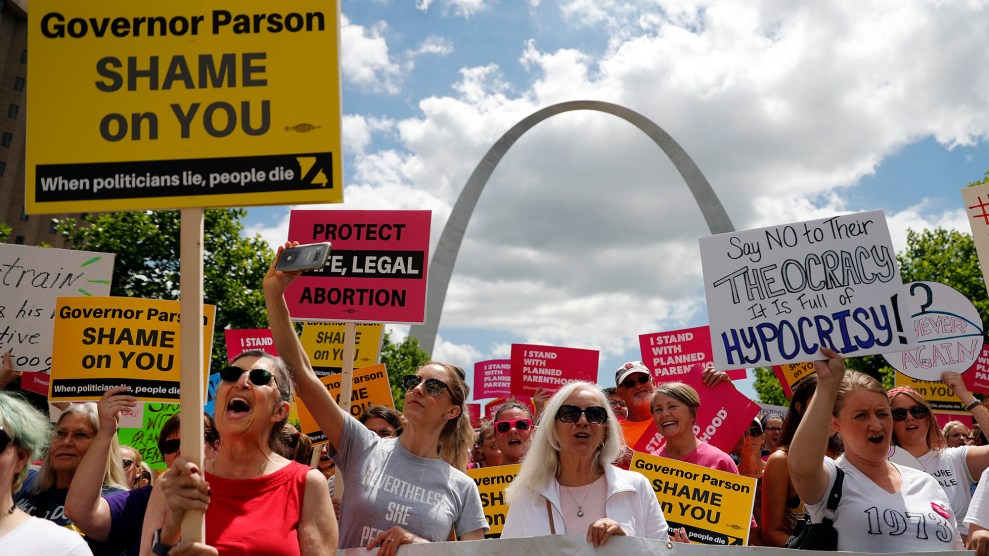
Protesters rally in St. Louis, where Missouri's last abortion might close Friday unless a judge intervenes. Jeff Roberson/AP
Update May 31, 2019, 2:50 pm: Hours before the last abortion provider in Missouri was set to close, a St. Louis judge ordered a temporary restraining order that will keep the clinic open until at least Tuesday, when a preliminary injunction hearing is scheduled to take place.
Unless the courts step in, on Saturday, June 1, Missouri will become the first state in the country without an abortion clinic since Roe v. Wade was decided almost 50 years ago. But it’s not because of the law that Gov. Mike Parson signed earlier this month banning abortions after eight weeks. Instead, the Planned Parenthood in St. Louis, the last clinic in the state, is being forced to close because the Missouri Department of Health and Senior Services is refusing to renew its license unless it complies with certain cumbersome requirements. The tactic, abortion providers and advocates say, is just another strategy to limit abortion access—one with a long and effective history.
“It’s a concerted effort to be the first state to shut down abortion in this country,” says Alison Dreith, deputy director of the Hope Clinic for Women in Granite City, Illinois, an abortion provider just across the Mississippi River from St. Louis. “[Abortion opponents are] using every tactic and tool they have in their toolbox.”
After an annual audit of the clinic in March, Missouri’s health department told Planned Parenthood that several issues might affect its license renewal, in part due to shifting state requirements. The clinic agreed to some changes, including additional pelvic exams, but refused to comply with the department’s request to interview a number of physicians who work at the clinic—most whom are independent providers, not Planned Parenthood employees, and some whom are residents or fellows—as part of an investigation into a patient complaint. The clinic deemed this specific demand “harassment.” State officials says they won’t issue a new license until they complete their assessment, forcing the clinic to close when its license expires at midnight Saturday.
In a last-minute attempt to keep its doors open, Planned Parenthood filed a lawsuit in St. Louis Circuit Court on Tuesday. It asked the judge for a restraining order and to bar the interview requirement, claiming that officials are improperly tying the license renewal to a patient complaint the state hasn’t disclosed. “The state has illegally weaponized the licensing process,” says Dr. Leana Wen, president and CEO of Planned Parenthood Federation of America. The judge is expected to rule Friday.
While the past few weeks have seen a slew of states pass increasingly restrictive abortion laws, complications with clinics’ licenses, like those in Missouri, have been slowly and much more quietly affecting abortion care in several states. Ostensibly, officials are trying to ensure women’s safety by taking extra precautions through additional rules and conditions before granting licenses. But many of the requirements aren’t, in fact, medically necessary, and they are primarily applied in states that are already hostile to abortion. These licensing requirements, governed by state health departments, come from what are commonly known as TRAP laws (Targeted Regulation of Abortion Providers). The approach picked up steam in the 1990s and has become increasingly popular in the past decade. Health departments have found more and more ways to tweak TRAP laws, shifting the bar for compliance and resulting in continually moving goal posts for clinics trying to comply—like requiring abortion clinics to be within a certain distance of a specific type of hospital, or setting the size for clinic procedure rooms or corridor widths.
“It just seems like another way that a state can use their authority or power to put in place a regulation on an abortion provider that they don’t place on any other type of health care clinic,” says Nikki Madsen, executive director of the Abortion Care Network, a national association of independent community-based abortion providers.
In Indiana, for instance, the Whole Woman’s Health clinic in South Bend recently asked a federal court for relief from state licensing requirements after more than a year and a half of trying to get the state health department to issue its license. (Whole Woman’s Health Alliance, the nonprofit overseeing Indian’s clinic and others in Texas and Virginia, is already involved in a civil lawsuit against Indiana challenging the constitutionality of its licensing requirements and abortion regulations more broadly, but the trial isn’t until August 2020.) After the South Bend clinic initially had its license rejected, it submitted a second application at the department’s suggestion but was then asked to submit a huge amount of additional information, much of which the clinic says it already provided.
“It just led us to believe—well, actually, to know—that they have no intention of issuing us a license,” says Amy Hagstrom Miller, CEO of Whole Woman’s Health Alliance. The South Bend clinic remains shuttered—but, Hagstrom Miller says, it’s “fully set up. It’s fully furnished. All the equipment is there. It’s ready, and it has been for quite some time. It’s just sort of sitting there waiting for us to be able to hire staff and offer care.”
Meanwhile, in Kentucky, there were 17 abortion providers shortly after Roe. By the time Republican Matt Bevin became governor in 2015, there were just three. Now there is only one, and it’s under siege. To get its license renewed every year, the clinic has long complied with a law requiring abortion providers to have a written transfer agreement with a local hospital. But in 2017, Bevin’s administration decided that the transfer agreement had to be signed by the hospital’s CEO rather than the head of the OB-GYN department, as had been the case for years without issue. Unable to get a hospital CEO to sign and facing closure, the lone remaining clinic and the ACLU successfully sued to keep the facility open. Last September, a district court judge found there was no medical reason or health benefit to require a written transfer agreement, let alone for the CEO to sign it. The judge also found that Bevin’s administration had put political pressure on hospitals not to cooperate with the clinic. “It was this Catch-22,” says Brigitte Amiri, deputy director of the ACLU’s Reproductive Freedom Project. “Even if you tried to comply, you couldn’t, and then there’s no other option but to go to court and challenge the action being taken by the department.” Bevin’s administration has appealed the ruling.
The Kentucky clinic is presently involved in four lawsuits challenging five laws that could shutter its doors, and anti-abortion protesters are there daily. Several people were arrested in 2017 after blockading the facility’s doors, keeping all patients either in or out.
Licensing requirements have also been particularly detrimental in Ohio. Like Kentucky, state law requires abortion providers to have written transfer agreements with local hospitals, but it allows the health department to waive the requirement if the facility has one or more doctors with admitting privileges. In the past few years, when clinics have applied for a waiver, the Ohio Department of Health has said they actually need two or three doctors with such privileges. In one case, officials even demanded the clinic have four, according to Amiri at the ACLU, which is heading up litigation against the state over the issue.
Last year, the Ohio Supreme Court ruled that the health department was justified in revoking the license of a Toledo abortion provider in 2014 after the clinic’s patient-transfer agreement was invalidated. This followed a rule change that said the partnering hospital had to be local and could not be a public hospital. As attorney general, now-Gov. Mike DeWine forcefully defended the state’s actions against the Toledo facility. (The clinic was able to find a new hospital to work with and resumed service in May.)
While the laws may seem mundane, they’re complicated and confusing, and that’s exactly the point. Experts argue they could be even more detrimental to the near future of abortion access than laws like Alabama’s blanket abortion ban targeting doctors, or Kentucky’s and Ohio’s laws that make the procedure illegal after six weeks. “While the nation’s attention is focused on the abortion bans, which obviously is incredibly important, I think it’s also equally important for people to understand that a state doesn’t need to ban abortion to eliminate access to abortion,” Amiri says. “And so Kentucky and Missouri, these are perfect examples of using laws short of bans…and everyone should be as upset and concerned about that.”
These provisions essentially manipulate the landmark 1992 Supreme Court decision Casey v. Planned Parenthood, which upheld the fundamental right to abortion established by Roe but gave states broad authority to regulate the procedure as long as it didn’t put “undue burden” on a woman seeking abortion—an ambiguous measure that states and advocates have been fighting over ever since. The Supreme Court even considered some of the TRAP laws in 2016, finding in Whole Woman’s Health v. Hellerstedt that Texas laws requiring clinic doctors to have admitting privileges were unconstitutionally limiting women’s access to abortion. But these new lawsuits over TRAP laws and subsequent licensing requirements are testing the limits of that ruling, and similar questions of “undue burden” may work their way again to the Supreme Court soon. In February, the Justices temporarily blocked a Louisiana law, almost identical to Texas’, that was upheld by a lower court. (Notably, Justices Clarence Thomas, Samuel Alito, Brett Kavanaugh, and Neil Gorsuch dissented.) The Court has not yet decided whether to hear the Louisiana case.
“Our clinics have been under these threats for many years, but the extremists are becoming more and more emboldened…to see how far they can push them,” says Madsen, whose organization includes a network of more than 100 abortion providers.
Missouri is just the latest test case. The second-to-last abortion clinic in the state closed last year after it was unable to get newly required physicians’ admitting privileges. Between that closure and a new state requirement for pelvic exams to be performed even for medication abortions, despite the fact that the American College of Obstetricians and Gynecologists does not recommend this practice, more Missouri women have already started going out-of-state to obtain abortions. If the Planned Parenthood in St. Louis does close, that number will only increase and women in the state could have to drive anywhere from 10 minutes to over three hours across the border to find a clinic. And that’s if they have a car. “No one should be forced to navigate these burdensome barriers, including leaving their home state in order to access abortion care,” Madsen notes. (The Abortion Care Network recently set up a hotline people can call or text to find their closest abortion provider.)
Now, the Hope Clinic for Women, right across the border in Illinois, is gearing up for the likely closure of the St. Louis facility. About half of the Hope Clinic’s patients already come from Missouri; it’s just a 15 minute drive from downtown St. Louis. “It’s really been all hands on deck,” Dreith says. The clinic had an emergency meeting the day Planned Parenthood announced its pending closure. They hired a lawyer, and they’re looking into hiring new staff and the possibility of adding additional hours or days they’ll perform abortions.
In contrast to Missouri, Illinois has been actively expanding abortion protections—putting the staff at Hope Clinic on an emotional rollercoaster, as they’ve seen Illinois shore up reproductive rights while Missouri drastically restricts them. The same day Planned Parenthood said it might close, the Illinois House of Representatives passed a sweeping bill to protect abortion. “We’re really seeing it all as this unique border city that is kind of a clinic in two different states, even though we’re only operating in one,” Dreith says. In April, the Hope Clinic put up a billboard near the state line along the interstate coming from St. Louis that reads: “Welcome to Illinois, where you can get a safe, legal abortion.”

















